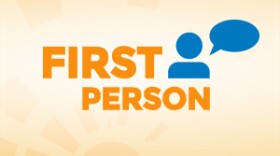Sometimes the best way to learn about a new story is from someone who's lived it today on Midday Edition we're launching an ongoing series called, first-person. Our first-person stories will tell you not just what happened but what it felt like about people's hopes and fears and about the extraordinary twists and turns in ordinary lives. We begin our first-person series with a young San Diego man who's headed on a path of new expectations. He is a first-generation college student beginning freshman year at San Diego State. Is one of the graduates of the nonprofit Reality Changers program that helps young people from low income families get ready for college. I've been involved in reality changes in the eighth grade when I was kicked out of class and sent to the counselor's office. My name is Daniel Noriega. I'm 18 years old and I will be attending San Diego State University this fall. I was kicked out of my English class for being disruptive to the teacher. She was like, she wrote me a referral for suspension and those in the counselor's office waiting for my counsel. He walked in and he was like, you know what, I'm not going to accept this. Go to the auditorium. Why would he go to the auditorium when I'm supposed to be suspended? There was this white dude, he was the founder and president. He was giving handshakes which was weird because I was not used to a white male looking me in the eyes That was the first thing that was intriguing. They had a bunch of books on the table. They had a bunch of student stories. They had a bunch of presenters from the alumni showed videos of people walking around with sweaters. I'm sure all my peers thought it dish why were they so happy over sweaters when I can go to the store and buy the same sweater. It was a bigger meaning behind the sweater. Sadly, the only instance I had with a white male was me and a cop. So that was not a good picture. When he came up to me and gave me the hand shape and he gave me a smile and he gave me that welcoming feeling -- it was a feeling I never got from white males or anyone in general at that point in my life. It was a welcoming feeling. I was supposed to be here for some reason. Let's see what he has for me. Growing up in City Heights was, affiliate was challenging. In the sense that back in Riverside I was already, I wasn't involved but I was presented with graphics. My cousins were in gangs. I had that family back home. Coming back to City Heights there was no change. I know a lot of people that were part of gangs and were doing drugs. It could've been an easy slip for me to go back. What I've learned to the program has been there's obviously -- to be patient. I was always -- I need stuff now. And so when I set a goal and I joined to attended university, that was not going to it happen anytime soon. It took me five years. It was patients. It taught me to give back into not expect everything back. Atoll republics taking skills. Studying skills. Me getting used to the puzzles of working and going to school and getting help from tutors. Accepting help from tutors was a big step for me. I did not want help. But I knew I couldn't get to a certain place without help. So accepting help from the tutors -- tutoring the upcoming eighth graders with their work so that taught me tutoring skills. To smile, to be honest. The skill of being positive and trying to spread as much as possible. I know how hard it is for people to think positive. No one in my family has ever gone to university. It's like -- it's like jumping into the deep end you have no one to teach you how to swim. You have to teach yourself how to swim. I can't go home and have my mom teach me statistics. I can't go home and have my dad help me with my essay. Many people tell me that college was a job itself. I did not believe it until I started taking college Kansas. Discloses. I would take 16 units in the fall. I know that will take up about 40 or 50 hours of school. I plan to work at the same time to keep myself -- my financial needs onset and how my parents as much as possible. So it's going to be super hard but I'm ready for the challenge and I'm ready to get adjusted to the new lifestyle and start a new chapter. That was Daniel Noriega talking about how he became a first-generation college student.
It's that time of year when students across the nation are preparing to embark on their college careers.
Getting into a four-year university is a major accomplishment, especially for students like 18-year-old Daniel Noriega of City Heights.
Noriega is the first person in his family to go to college, and he said he couldn’t have done so without the support of the nonprofit Reality Changers.
Reality Changers helps low-income students become first-generation college students. It provides tutoring, mentoring and after-school college readiness programs.
Noriega, who is attending San Diego State University this fall, shares his journey as part of our First Person series.
Hit the play button above to hear his story.






